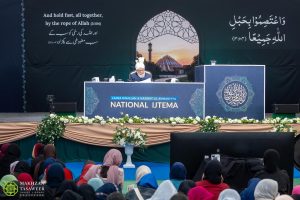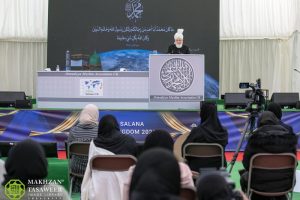
© Shutterstock
Nila Ahmad, USA
Today marks International Widow’s Day, ratified by the United Nations to bring attention to the difficulties many widows and their families face, even in the current era. In many cultures and societies, widows are faced with significant financial and social struggles. Problems commonly faced by widows include poverty, violence and social stigma.
For over 1400 years, the religion of Islam has safeguarded the rights of widows in many ways, including (but not limited to) inheritance, residence and remarriage.
Firstly, Islam ensures that a widow receives a share of her husband’s inheritance. In the Holy Qur’an, God Almighty commands:
And they shall have a fourth of that which you leave, if you have no child; but if you have a child, then they shall have an eighth of that which you leave, after the payment of any bequests you may have bequeathed or of debt. (4:13)
In this commandment, it is important to note that the division of inheritance comes after any bequests, which includes the Haq Mehr, or dowry promised at marriage, if the husband had not yet given it to his wife. Thus, God Almighty has set up a comprehensive system within Islam to ensure that widows receive support and security during this vulnerable time.
Secondly, Islam ensures that widows have a place to stay when their husband dies. In the Holy Qur’an, God Almighty commands:
And those of you who die and leave wives behind, these (wives) shall wait concerning themselves four months and ten days. And when they have reached the end of their period, no sin shall lie on you in anything that they do with regard to themselves according to what is fair. And Allah is aware of what you do. (2:235)
Allah’s compassion guides this commandment for it is truly a provision of security and support for the widow. Not only is the commandment a waiting period for women to discover whether they are expecting a child, but it is also a security measure to ensure that if the woman is living with extended family or in other circumstances, she is not kicked out of her home during her period of grief.
In addition to the period of four months and 10 days, God Almighty has also included an additional provision for widows if they wish,
And those of you who die and leave behind wives shall bequeath to their wives provision for a year without their being turned out. But if they themselves go out, there shall be no blame upon you in regard to any proper thing which they do concerning themselves. And Allah is Mighty, Wise. (2:241)
It is a commandment to provide for the widows an additional year to the four months and 10 days. Logistically, there are so many hurdles for a woman to go through on top of her mourning the loss of her husband that this extra year allows her time to take a breath and figure out what she needs. It also is the approximate time she would need to deliver a baby if she finds herself to be pregnant.
Thirdly, Islam encourages widows to remarry (if that is what they want) and encourages society to find marriages for widowed women. His Holiness Hazrat Mirza Masroor Ahmad (aba), the Head of the Ahmadiyya Muslim Community, has stated:
I would like to talk about marriage of widows in some Eastern societies. In these societies marriage of a widow is considered unacceptable, even a sin. Therefore, those who wish to get remarried, even if they have a decent proposal, are unable to do so because as I mentioned earlier, their relatives consider it to be a major sin. These women are gossiped about in so many ways that they are pushed deep into depression and lose interest in their own lives. The irony here is that while in Europe, these families become open minded and liberal in other matters, some of which are not even allowed by Islam, but in the matter of marriage of widows which is actually a commandment from Allah Almighty, they are overcome by a false sense of honor… Allah Almighty clearly declares that if you wish to spread righteousness in society then try to arrange marriages for widows. (Garments For Each Other)
The remarriage of widows is of fundamental importance in Islam and is exemplified by the founder of Islam, the Holy Prophet Muhammad (sa) who married Hazrat Khadija (ra) when he was 25 years old and she was a 40-year-old widow. They were happily married for 25 years until she passed away.
Thus, in Islam, the All-Compassionate God lays out a framework which allows widows to pause, to collect themselves after their husband’s death and mandates the support of a safety net which all Muslims are expected to offer the widow, no questions asked. Furthermore, God grants widows the choice to remarry or not, the choice to be their own representatives, and the opportunity for them to persevere and continue with their lives as they choose fit.
About the Author: Nila Ahmad lives in the northeastern United States with her family. She has a particular interest in dispelling misconceptions around women’s status in Islam. She currently serves as the Head of the Women’s Section for The Review of Religions.




Add Comment